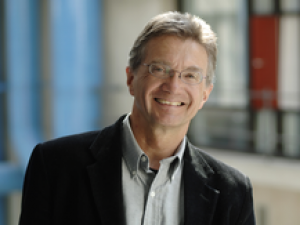
IMI Programme office: U-BIOPRED transformed the asthma field by discovering subtypes of severe asthma. Apart from being transformative in terms of results, this project has been transformative for the people in the project as well. How has it been transformative for you personally?
Peter Sterk: This project transformed my collaboration with international colleagues. Yes, we know our colleagues and we sometimes do things together but this project was based on a very intensive collaboration with colleagues in various European countries. It changed my way of working with the industry, with patients, and in fact changed my career at my university. Being involved in U-BIOPRED gave me a wealth of information, enthusiasm and modesty in terms of collaboration. It was a backbone of all my research during the last 8 years or so and all my other projects were somehow connected to this big project. If I hadn’t had the opportunity to work in U-BIOPRED I would have been a different scientist and a different player in the field – that is absolutely certain.
IMI: How did the collaborative nature of IMI’s public private partnerships contribute to the project? Could the same results have been achieved without IMI?
Peter Sterk: Without IMI this would have never happened because it is one thing to get the academic centres around the table—we know each other even though we are competitors. But sitting together with companies is another thing. Academics are sometimes working with companies one-on-one, but 12 companies sitting together around the table with academics—that has never been done in this field, ever! It has built a lot of confidence and trust among the scientists in the academia and companies but also at higher layers in the companies—we know now that it is possible to collaborate in a pre-competitive way.
IMI: What is the most rewarding aspect of this project for you?
Peter Sterk: We now have scientific data showing the subtypes of severe asthma that are being recognised and appreciated by all the partners in the project: the patients, the scientists from EFPIA and the academia. The rewarding thing is that this was a collective/collaborative effort—we did this together. Yes, at the end of the road, our statisticians identified the subtypes after all the collection of the data, but they know that they wouldn’t have been able to do it without the clinicians nor without the patients. It was a truly collective thing and that’s the most rewarding element. Also, there is not a handful of people who are running away with the results—it is all of us.
Read the full interview
